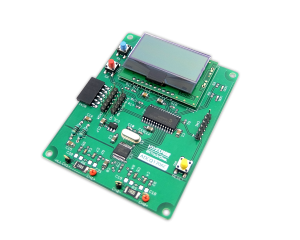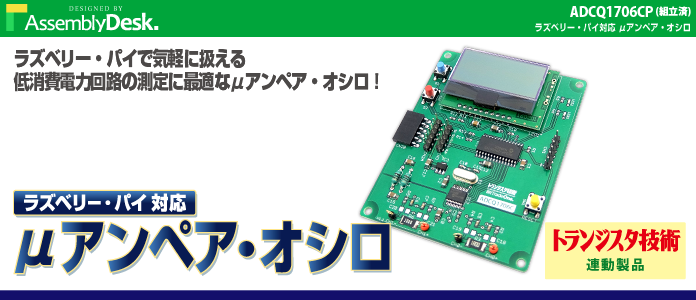
ADCQ1706CPRE Raspberry Pi compatible! μamp oscilloscope
SKU 4562469773759
Availability:
Only 1 left!
Sale
Original price
¥8,448
Original price
¥8,448
-
Original price
¥8,448
Original price
¥8,448
Current price
¥6,758
¥6,758
-
¥6,758
Current price
¥6,758

For measuring the power consumption of battery-equipped IoT devices! 2 range configurations of 0.1 μ to 20 mA and 1 μ to 0.5 A
μAmpere oscilloscope ideal for measuring low power consumption circuits that can be easily handled with a Raspberry Pi!
Product Summary
It is necessary to measure the actual current consumption when manufacturing equipment using low power consumption circuits in IoT. Ordinary measuring instruments cannot accurately measure minute currents on the μA level that dynamically change more than 100 times. This is where the μAmpere oscilloscope comes in. It can measure currents that change from the μA level to the mA level as accurately as possible.
*Simple assembly/instruction manual and Windows application must be downloaded from our website.
Product features
Measure the power supply current of low power consumption circuits!
Micro currents on the μA level, which dynamically change more than 100 times, cannot be measured accurately with ordinary measuring instruments. This product is a μAmpere oscilloscope that can accurately measure current that varies from μA level to mA level.
Measure less than 1μA ! ΔΣ (ruby: delta sigma) 24 -bit high-performance AD converter
Uses a high-performance ΔΣ A-D converter with 24-bit resolution! Continuously measures minute power that fluctuates dynamically in high-speed operation.
Visual measurement of dynamic current changes of over 110dB !
Use Raspberry Pi as a high-performance component! Utilizing the network performance of the Raspberry Pi, it is displayed on graphs and browsers. Dynamic current changes of over 110 dB, such as intermittent circuit operation, can be visually measured with a resolution of 0.1 μA.
Connect with USB ! Includes a serial conversion adapter
A serial conversion adapter is included as standard, allowing direct connection to a Raspberry Pi, PC, etc. via USB.
